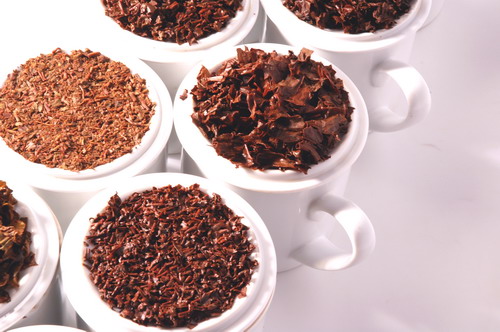Life has become a compromise – in tea, it is a compromise (for most brand owners) between profit and quality, with quality losing out unfortunately. Ultimately though the power to tip that balance back in favour of quality lies with the customer. The more customers know about tea, the better for integrity in tea. Of course it’s not quite that simple though, because knowledge of tea is so poor generally that most consumers don’t even know how to brew their cuppa in the right way.
The wine industry got that right. Education inspires passion, and the more consumers learned about wine, the more good quality wines they consumed. With the rise in consumer knowledge of quality in wine came greater pressure on winemakers to deliver quality. The hundreds of family or owner operated vineyards that made up the majority of the wine industry was more than equal to the task. The whole industry benefited for knowledge drove satisfaction, appreciation, desire for better wines. Gone are the days of Red, White and Rose.
Tea was there once, although the very success that a colourful, passionate tea industry achieved in making tea the most consumed beverage on earth after wine, brought about its downfall. That success attracted the corporations – read about them in Prof. Bakan’s ‘The Corporation – and the rest is history. Tea is not compatible with dispassionate commercialisation. Quality was first to go as the giant profit machines that came to own most of the tea category, sought to recover their investment in their new acquisitions. Next went that wonderful stimulus for innovation – competition – as the corporations sought to dominate tea, as they did in pharmaceuticals, personal hygiene, carbonated beverages, spirits and the like.
It seems strange that in seeking to enter and grow in the tea category by acquisition, the corporations that bought into the category cut out of their acquisitions the very elements that made them attractive for takeover in the first place. One of the more recent such examples is a European family tea company with a tradition of over a century. Their new American owners arrived over a decade ago with the promise that nothing would change. Several thousand redundancies later, the ‘cost cutting’ has ended a tradition of generations of people working entire lifetimes for this once great company. Even the Tea Tasting Dept., has gone. Their product carries the same name though, but tastes very different.
There is no substitute for tradition. If ‘cost cutting’ and ‘profit maximisation’ are reasons for cutting the heart out of companies, then they are immoral. On no account should any individual or business forget that we are human because we are humane. Whether it is quality, or care for one’s employees, profit is not an excuse. The wine industry today is undergoing the same trauma that tea went through almost a century ago. Small producers who have made their mark with quality are being bought by large corporations for unimaginable amounts of money. Let us hope that in their bid to recover and profit from these expensive acquisitions, the new owners will not forget the reasons why these companies were successful in the first place.
The possible takeover of Anheuser Busch is in the news. If the transaction goes through, change for the worse is inevitable. History will repeat itself. There is something so very wrong with the way the world does business. And yet the solution is so obvious; it is the way the world did business a couple of centuries ago, owner operated businesses, with a heart and a love for what they do, with integrity and care for their product and their customer. It’s a long shot, but in this time of change and adaptation to new realities I hope that along with the environment and the climate, the powers that be will understand that these issues are all interrelated. Externalising environmental factors for the sake of profit is done for the same reason and by the same entities that externalise values of humanity and integrity. Quality is just the tip of the iceberg, for with quality, ethics, the environment and the future goes too.
Some economists insist that the business of business is business, and that means profit. But as the role of business has widened and its influence intensified, there is an obligation for business to take on humanitarian and environmental roles that were previously shouldered by governments. The state has not disappeared yet but the reality is that the policy of many governments today is dictated by commercial interest. Some refuse to respond to mounting and urgent environmental priorities because they believe it is bad for business. Others give up their prized and critical natural resources to predatory businesses because they believe it is necessary for their economy.
All this started with quality, and it ends there too for quality is just one dimension of integrity. When tea, coffee, chocolate or other businesses compromise their integrity, they compromise everything. To end this post, I share with you an image of our very special Watte, Single Estate Teas. We taste over 5,000 teas each week to make sure that we select just the right teas for our customers. That may seem old fashioned but it is the only way we can ensure that we do not compromise on quality. With that commitment to quality comes the other components of old fashioned, family business. You can read more about that here.
